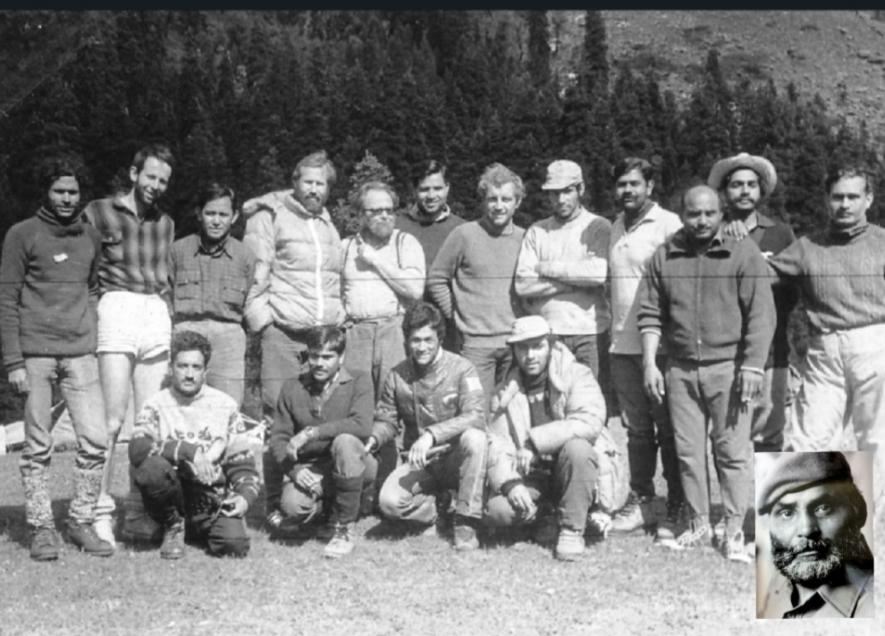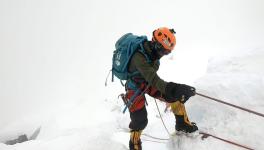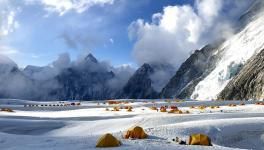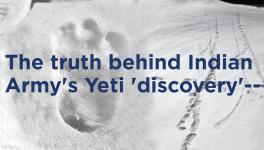Obituary | Col. Narendra Kumar: The Raging Bull of Indian Mountaineering

At the 1973 International Mountaineers Meet Climbing Camp at Lidderwat, Kashmir: Chris Bonington (standing, fourth from left), Jean Coudray and Maurice Jiquel (standing, seventh and eighth from left) with Col Kumar (standing, third from right; and inset). Also seen are Dorjee Lhatoo (kneeling, third from left) and the author (standing, extreme left).
It was a sunny afternoon in the summer of 1969 when on a visit as an instructor for an adventure course, I met (then) Lt. Col Narendra Kumar, the fourth principal of the prestigious Himalayan Mountaineering Institute (HMI) in Darjeeling for the second time in my life. I had met him briefly when he had come to Kolkata for an official function a year earlier, but this time I was to interact with him closely. He received me warmly and a bond was established which remained intact until the legendary mountaineer passed away on December 30 at the Army Research & Referral Hospital in New Delhi, bringing to an end an illustrious and impactful career in adventure spanning more than six decades.
Col Kumar, popularly known as ‘Bull’ Kumar among his friends and in adventure sports circles, was perhaps the first Indian adventurer who excelled in a number of adventure activities. Besides being a fine climber (he was a member of the first summit party on India’s first Everest expedition in 1960 which had to turn back just 700 feet short of the summit because of bad weather), he proved his organising capacity as the deputy leader of the first successful Indian Everest expedition in 1965. In administration too he showed his mettle as principal of HMI, Darjeeling, and of the Indian Institute of Skiing and Mountaineering (IISM), Gulmarg, and as Commandant of the High Altitude Warfare School (HAWS).
He was the first to organise a successful rafting expedition on the Teesta in Sikkim, the Indus in Ladakh and the Brahmaputra in Assam and Arunachal Pradesh during the 1960s, ’70s and later years. He also led the first successful Indian skiing expedition which skied down from the summit of Trisul (7120 m) in 1976.
Also Read | Nonexistent Club in Governing Council of National Motorsports Federation as Founder Member for 49 Years
Perhaps his finest hour was his leadership of the 1977 Indian Army team which made the first Indian ascent of Kangchenjunga (8586 m), climbing by its uncharted northeast spur on the Indian side. For this he was awarded the PVSM, becoming the first Lt Colonel to receive it. He also led the first ascent of Chomolhari, Bhutan’s highest peak, in 1970. He was deputy leader of the first successful Indian Everest expedition which put a record nine men on the summit.
But the country will probably remember him most for his pioneering exploration of the Siachen glacier, during which ascents of Teram Kangri II (7407 m) and Sia Kangri (7442 m) were made in the late 1970s and early ’80s. It was Col Kumar’s exploratory work that helped India secure the strategic Siachen glacier. In recognition, there is a battalion HQ on Siachen Glacier named Kumar Base, a key forward logistics post at 4880 m.
During his tenure at IISM, Gulmarg he organised the International Mountaineers’ Meet Climbing Camp at Lidderwat, Kashmir, in 1973 where top international climbers including Chris Bonington (UK), Jean Coudray and Maurice Jiquel of EMSA, Chamonix, France and others demonstrated the latest advancements in climbing technique and gear. I attended the camp as a trainee and so did Col Kumar himself along with other reputed Indian climbers.
Early in his mountaineering career, he had several toes amputated due to frostbite during an expedition he led to Nilkantha in 1961. His subsequent accomplishments took place despite this.
Born on December 8, 1933 in an illustrious family of Rawalpindi in undivided India, the strong and stout Narendra had an affinity for the outdoors from a very young age. At 13, as a schoolboy, he went to Paris in 1947 to attend a Boy Scouts jamboree, representing India.
Following in his elder brother’s footsteps, he joined the Joint Services Wing which is now called the National Defence Academy. At Military College, now the Indian Military Academy, he participated in cycle polo and boxing. Here he was given the nickname “Bull” for charging like a raging bull during boxing bouts. He was commissioned in Kauan Rifles in June 1954.
Also Read | New Year, New Rules: Wrestling Takes the Plunge, to Hold Nationals But With Glaring Oversights
He completed the Advance and the Instructor courses at the Winter Warfare School in 1956 and then the Basic and Advance courses at the Army School of Physical Training. His aptitude for mountaineering flourished when he attended the Basic course at HMI in 1958. Tenzing Norgay, whom he admired greatly, was then Director of Field Training. The bond then established was to grow stronger when Kumar became Principal in 1966.
He led an Army-Navy expedition to Trisul in 1958 and the next year joined the Advance cum Pre-Everest Expedition to Rathong and was chosen for the first Indian Everest Expedition led by Brig Gyan Singh in 1960. After Nilkantha, he led an expedition to Nanda Devi which made the first Indian ascent of the peak in 1964.
Col Kumar was conferred the Padma Shri and also the Arjuna Award for the Indian success on Everest in 1965.
He was awarded the Kirti Chakra, Vishisht Seva Medal (VSM) and Ati Vishisht Seva Medal (AVSM) for distinguished service to the Indian Army.
In 2010 he won the MacGregor Medal awarded by the United Services Institution of India for the best military reconnaissance, exploration or survey in remote areas. He also received the Indian Mountaineering Foundation Gold Medal.
Also Read | Learning to Write on Sport Again, And Refusing to Accept a New Normal
He served as IMF vice-president and member of the governing council for several years and headed the Winter Games Federation of India from 1996 to 2006.
Col Kumar is survived by his wife, Mridula, and daughter, Sailaja. Sailaja represented India in the Calgary Winter Olympics in 1988 in alpine skiing — the first Indian woman Winter Olympian. His son, Akshay, was a whitewater sports enthusiast and adventure travel professional, died in September 2020.
Col Kumar was always ready to support the cause of mountaineering and adventure in the country.He was also known to be a good host and would organise a “Happy Evening” at his Delhi apartment every year when mountaineers came to the city for the IMF’s AGM. His passing has left a void which will be difficult to fill.
(The author is a veteran sports journalist and mountaineer from West Bengal. Among his many legendary climbs is the 1974 ascent of Uja Tirche)
Get the latest reports & analysis with people's perspective on Protests, movements & deep analytical videos, discussions of the current affairs in your Telegram app. Subscribe to NewsClick's Telegram channel & get Real-Time updates on stories, as they get published on our website.

















